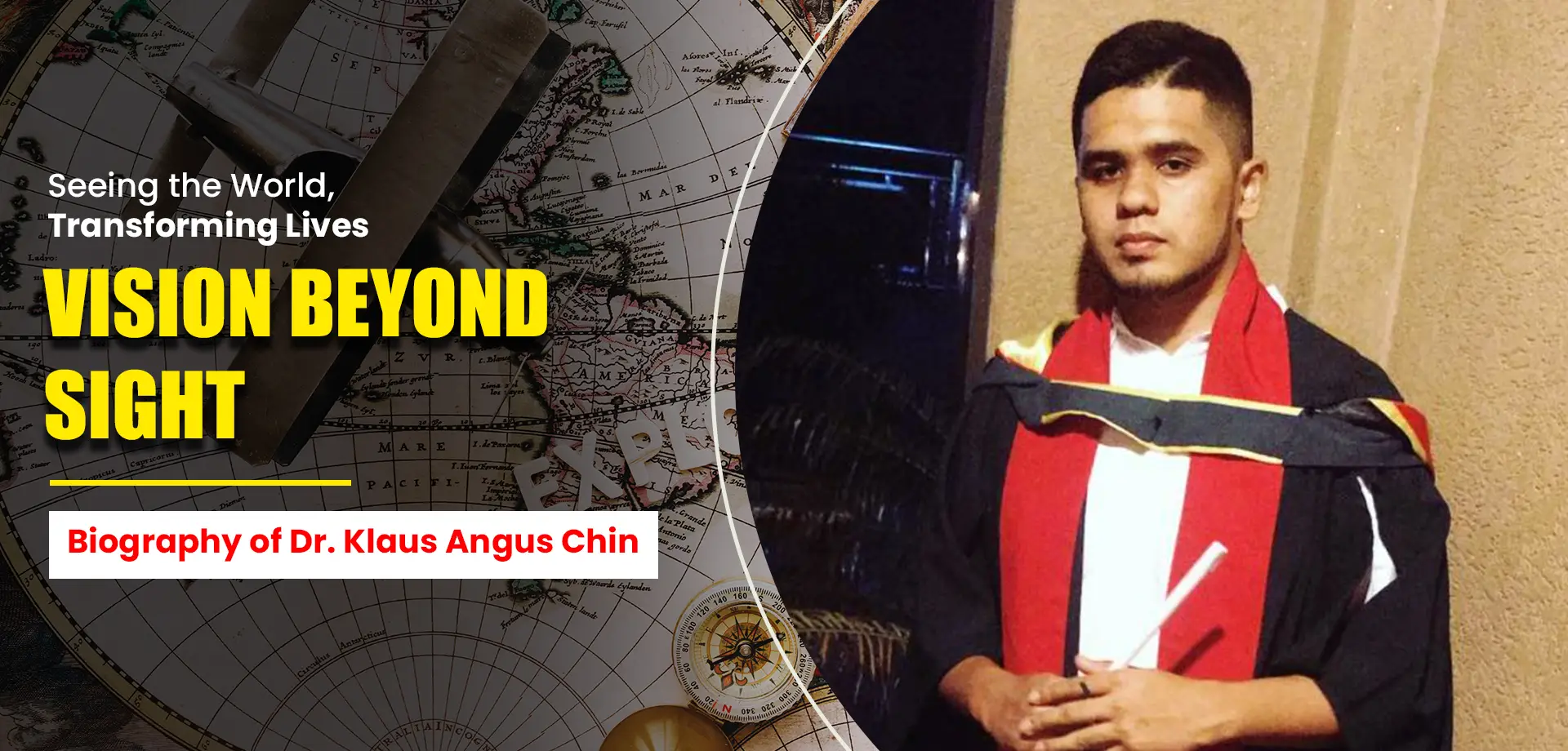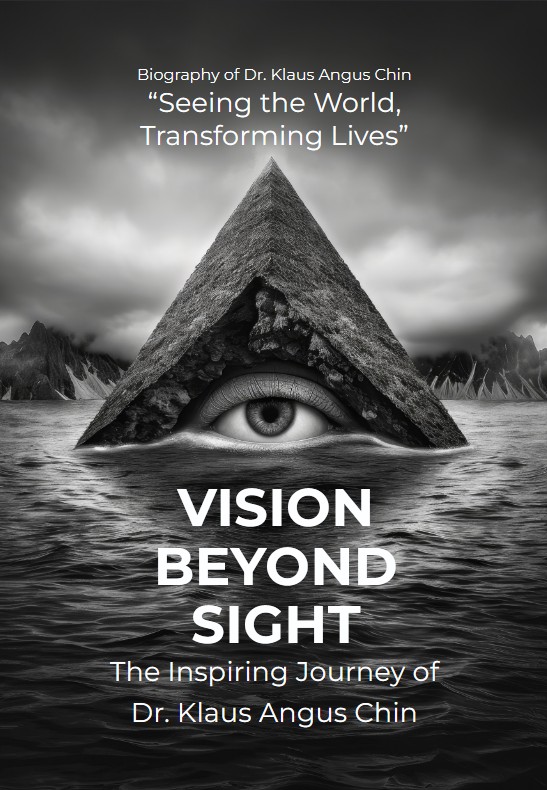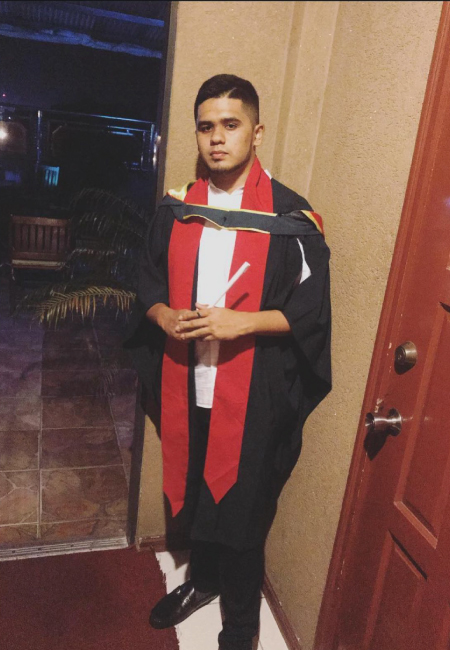

“Your vision will become clear only when you look into your heart. Who looks outside, dreams; who looks inside, awakens.”
Introduction
With every profession comes a combination of reasons that led a person to their chosen path – Dr. Klaus Angus Chin is no different. Chin was born in Georgetown, Guyana, a relatively modest town. Guyanese had limited access to recourses, but a lot of it was built around community which shaped Klaus’s early years. From humble classrooms to the lecture halls of the University of Guyana, his journey was propelled not by entitlement but by an inner flame to serve.
Klaus did not aspire, he achieved. He started a pert-time delivery business along with his studies. His impressive vision helped him secure an internship with one of the leading pathologists in the town. Employment during study, combined with sheer passion laid the stones of his career.
What was even more astonishing, is his decision to open New Vision Medical Centre at the old age of 23. The audacity of this decision was unimaginable. Remove what is referred to as “The eye hospital” by locals, there are only a handful of legacy clinics around and wielding power structures throughout the country. With these put in place, Klaus remained on the right path with altruistic ideals to expand medical care along with pivot with northeast living people framework which focused on charity fundamentally changing health eyed in their country.
This biography explores the arc of that remarkable journey: the triumphs, the tribulations, and the tireless pursuit of excellence. Along the way, it reflects on how faith, family, and fortitude shaped a young man with a dream into a visionary with a mission.
Phase 1 : Roots of Resilience – Childhood in Georgetown
“Perseverance is failing 19 times and succeeding the 20th.” – Julie Andrews

Klaus Angus Chin was born on a humid June morning in 1979, in the bustling neighbourhood of Albouystown, Georgetown, Guyana. The eldest of three children, he grew up in a modest wooden house nestled between the cacophony of street vendors and the gentle lapping of the Demerara River. His father, Alistair Chin, worked as a government clerk—methodical, reserved, and devoted to providing stability for his family. His mother, Mavis Chin (née Angus), was an elementary school teacher who worked at the Plantation Blairmont school and Klaus noticed that his mother deeply cared about children and reading, something which created a moral foundation within him that leaned towards kindness.
Klaus learned how to function within boundaries. Resources, as usual, were scarce. Electricity was very likely to die out during the rainy season and water, just as rainfall, was likely to be in short supply. Within these frameworks, community, and the strength it has come to his aid. Every Saturday, his mother pulled in neighbourhood kids into their kitchen and taught them reading and writing with candles during nights. As a seven-year-old, Klaus was more than happy to help his younger siblings learn their ABC’s which made him feel very proud of himself and eager to teach others.
Weekends were spent visiting relatives in the rural Essequibo interior. On weekend trips, he rode on the incredibly bumpy buses which often got clogged in coconut ranch incoming traffic and couldn’t stop himself from admiring the spectacular view of sunlight streaming into coconut palms which he had big hopes for, hoping to one day helping those who were visually impaired. His grandfather, a farmer for the local markets, also imparted to him the importance of manual labour. He would get uncle work like-sanction cassava during sunrise, lifting crates filled with bananas and sore back at sunset.
All these daily tasks served Klaus with a dose of modesty and stubbornness, important pointers for the many never-ending ordeal he would have in the future.
The evenings were split between laughter and studying, with Keron lining up for step math, biology, science, and medicine textbooks and journals from the public library. Despite struggling financially, his parents worked hard attending to weekend tutorial classes and trying to help in any way possible with the valve at the end of the scholarship funnel. None of these hurdles were burdens—rather, they were paths towards becoming more capable and resilient, and Klaus learned that each struggle can be met head on.
Seeing his father go through a traumatic workplace injury at the age of ten kept the family in a constant state of living check to check and without a safety net. Even with the meagre savings that we managed to scrap together, the costs of treatment for the injury had to be paid. This taught Klaus a plethora of responsibilities, from cooking to taking care of his younger brother Bradley to even little things like attending small business markets on Sundays. At the end of the day while it might not look seamless, he realized that he was witnessing the unspoken promise and difficult commitment his parents put in for each other to weather numerous challenges with dignity, and that sticked with Klaus throughout his journey.
Phase 2 : Educational Odyssey From Public School to University of Guyana
“Live as if you were to die tomorrow. Learn as if you were to live forever.”
Klaus’s formal education began at Marian High School, an all-boys institution renowned for academic rigor and a tradition of community service. As a newcomer at age eleven, he was quite intimidated by senior students in uniforms who strutted the hallways like they owned the place. Nevertheless, Klaus’s resolve was greater than any first-day jitters. He became known for dominating in mathematics, winning science fairs, and for being on the debate team; he even took it upon himself to tutor students who were struggling, which was something his mother used to do with him when he was a child.
During his fourth form year, Klaus received a fully sponsored scholarship that allowed him to attend weekly lectures at the University of Guyana’s Faculty of Natural Sciences. With the guidance of Dr. Ramadhar Persaud, he undertook summer research on the impact of rural toxins on ocular health – a rather early venture into the field of public health, predicting the direction his career would later take. In 1998, he won the University’s Emerging Research Award with his paper entitled “Pesticide Exposure and Vision Decline in Essequibo Villages,” earning him the title of the youngest awardee in the history of the award.
He earned good marks, but extracurriculars like volunteering and leading the Guyana Youth Leadership Association were still highly prioritized. In the association, Klaus initiated vision screening drives in underprivileged schools, getting other students to help. His leadership skills flourished as he began to understand that no one followed the orders of a leader who never listened: teachers wanted to share their concerns, methods needed to be tailored for local conditions, and eye charts needed rudimentary designs that could be appreciated in local culture. It is because of his innovation that he was respected not just in schools, but also in community centres.
After reflecting on how he got to the leafy campus of the university from Albouystown, Klaus felt accomplished. This was in the year 2002 after graduating with first class honours in Optometry. The long hours of study, the tight budgets, and the unrelenting drive to serve had shaped more than a capable clinician—they had forged a visionary. While his peers decided to move abroad to take up opportunistic roles, Klaus selflessly decided to make them voluntarily work in the communities that raised him.
His early accolades—scholarships, awards, and leadership roles—were milestones on a longer quest. They demonstrated that education was not a privilege reserved for the few but a transformative tool for anyone with the courage to seize it. And for Klaus, each lesson learned in Georgetown’s schools, and within the halls of the University of Guyana, would become a stepping-stone toward a life dedicated to illuminating the world, one patient at a time.
Phase 3 : Entrepreneurial Beginnings Smart Cart Delivery Service
“The way to get started is to quit talking and begin doing.”

While most undergraduates juggled lectures and lab reports, Klaus Angus Chin balanced an unexpected third responsibility: running his very first business venture. In 1999, armed with a small loan from a family friend and an indomitable spirit, he launched Smart Cart Delivery Service, a rudimentary courier operation designed to transport groceries and prescriptions across Georgetown. What began as a one-man bicycle run soon grew into a fleet of three motorized carts—each bearing the Smart Cart logo hand-painted by Klaus himself.
As recess times and extracurricular tutorials for high school students were Klaus’s free time, deliveries were managed during his early mornings and late at night. Working around every clock and shifting to deliver on time became second nature to him. More often than not, Klaus would wrap up his delivery runs at 3 am and catch a quick four-hour nap before presenting a group project on ocular physiology. Klaus’s peers were amazed at how honed his time management skills were and how every second of free time was converted to productive work. This was clear evidence that entrepreneurial spirit deeply ingrains in a person’s disciplined time management.
Klaus’s unanticipated growth to acting head for marketing, customer relations, and finance all occurred before breakfast, which was facilitated by the rapid growth of Smart Cart and his high school classmates. As a part-time operator, he had a harness on assessing people’s reliability under pressure. When one operator continually no-showed during scheduled runs, Klaus called a team discussion- conducted analysis and strategy on the effect of their work on the customers and compiled a shift restructuring that was swappable with school hours. This worked exceedingly well not just for solving the issue at hand, but for fostering ownership and resolution within the team.
As Klaus’ meetings at local cafés became more routine, he would go as far as to call them “debrief” sessions. Operators shared feedback acquired during road-testing, recounting tales of traffic bottlenecks, packaging pecuniary issues, and customer preferences. Such gatherings were not constrained to operational matters—they morphed into meeting hubs for new ideas. One evening, inspired by a suggestion from a delivery intern, Klaus introduced insulated containers to keep medicines at stable temperatures. The improvement boosted client satisfaction and became a hallmark feature of Smart Cart’s service.
Having setbacks while pursuing an entrepreneurial venture is a guarantee. One of the carts malfunctioning mid rain season, would go on to be left at an unpaved road—this would spell disaster for perishable groceries left inside. Watching the weather, Klaus decided to bike across town to get the groceries after the delivery was made. Arriving drenched but unbowed, Klaus prides himself on using the incident to strengthen his dispute resolution training for his team and spare part maintenance. This case study in resilience stands proud, alongside the rest, proving that when paired with persistence, rapid problem-solving is vital to a polished work plan.